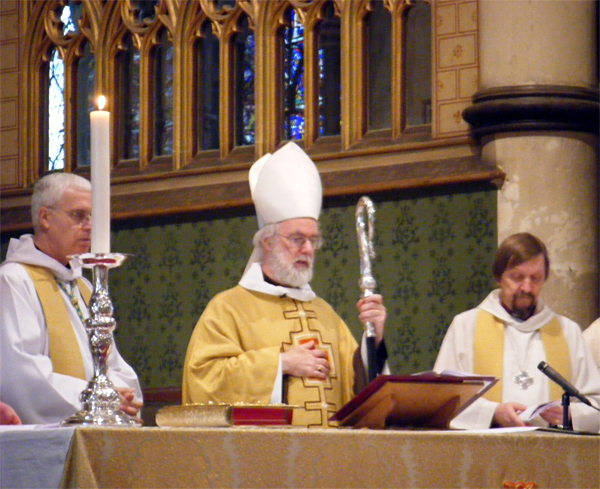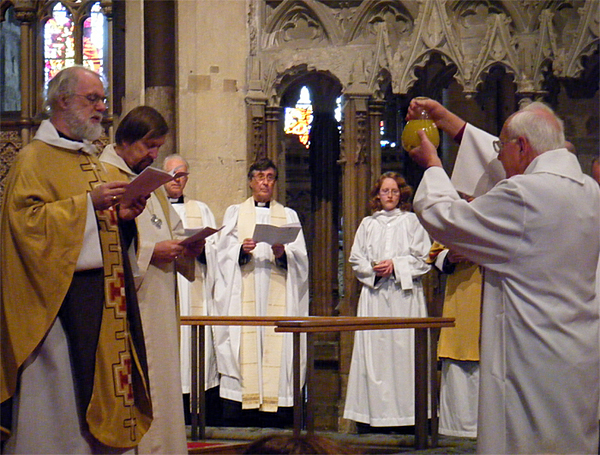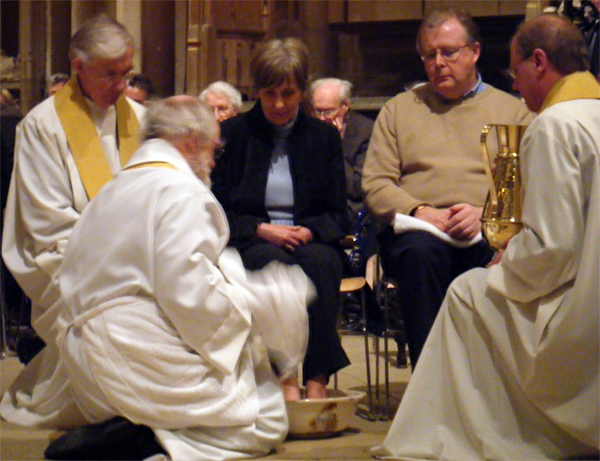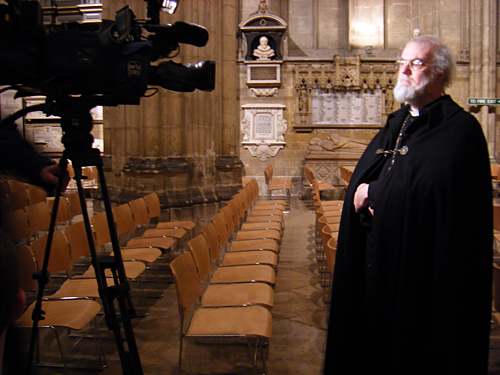Archbishop in Holy Week 2008
Thursday 20th March 2008
On Thursday 20th March the Archbishop of Canterbury, Dr. Rowan Williams, observed the Passiontide celebrations of Maundy Thursday at traditional services held at Canterbury Cathedral.Renewal of Vows and Blessing of the Oils

In his role as Bishop of the Diocese of Canterbury, Dr Williams led the Chrism Eucharist held in the Cathedral on the morning of Maundy Thursday. This annual observance sees the renewal of the ordination vows of the authorised ministers of the diocese and the blessing of holy oils used by the church the rest of the year.
The service includes lay and ordained ministers of the Diocese of Canterbury renewing the vows they made at their ordination, commissioning or licensing, and affirming their commitment to their particular ministries in the life of the Church.

The service also included the blessing of oils; in the course of Christian history oils blessed for the purpose have come to be used in many ways for the setting apart of people and things for a special place in the life of the Church, for Bishops and priests at their ordination, for Kings and Queens at their crowning, and for churches and altars at their consecration. During the service Dr Williams blessed three oils – the oil of catechumens, used to anoint those at baptism; the oil of Chrism, sometimes used at ordinations, for consecration or those making a profession of faith and the oil for the anointing of the sick and those close to death. The oils were then distributed to the attending ministers to take back to use in their parishes.
Click downloads on the right to read the Blessing of the Oils [30kb] and to watch a video of it [22Mb]

Eucharist and Vigil
In the evening the Passiontide observances continued with the traditional Maundy Thursday Eucharist with the washing of feet and the ritual stripping of the altar.
The washing of feet is a ritual which follows the example of Christ, who washed the feet of the twelve disciples at the Lord's Supper. The ceremony, reintroduced to Canterbury Cathedral by Dr Williams in 2003 after an absence of 400 years, is a re-enactment of what Jesus did and a response to his commandment to love one another; the new Commandment or Mandatum Nuvum, from which Maundy Thursday takes its name. It reminds Christians of their obligation to serve others. Dr Williams, assisted by the Dean, the Very Reverend Robert Willis, washed and dried the feet of 12 members of the congregation.
Click download on the right to watch a video of the Washing of the Feet [65Mb]
At the end of the service, the Archbishop carried the Blessed Sacrament in procession with the Dean and Chapter of the Cathedral to the Altar of Repose in the cathedral's undercroft to observe a vigil until midnight.
Above, whilst the choir sang Psalm 22, the Cathedral servers stripped the altar of the decorative altar cloths – a symbolic gesture reminding the congregation of how on his arrest, Christ was stripped of his garments. Like parishes churches up and down the country, the Cathedral was emptied of all ornament in silence and without ceremony, leaving the building in a sombre and reflective mood appropriate for the Passiontide observances of Good Friday and Holy Saturday. The service concluded with the Dean reading the Gethsemane narrative from the Gospel of St Mark (14. 32-51).
Archbishop's Easter Interview with BBC South East Today
 Speaking on Maundy Thursday to BBC South East Today from the cathedral nave, the Archbishop of Canterbury explained the significance of washing the feet of the congregation:
Speaking on Maundy Thursday to BBC South East Today from the cathedral nave, the Archbishop of Canterbury explained the significance of washing the feet of the congregation:
"I think it is one of the most significant acts of the year because it is one of those times when we do absolutely and simply what Jesus told his friends and followers to do. He said, 'I've washed your feet, you wash one another's feet'. And so when I kneel down in front of theses members of the congregation, it's a way of saying to them and I hope to the world around that in the Christian world, any kind of power or responsibility given to anyone is there for one thing only and that's to serve others''.
Read a transcript of the interview below, or click download on the right to listen [3Mb]
Interview with the Archbishop of Canterbury, Dr Rowan Williams
Beverley Thompson, BBC News: And joining us live from Canterbury Cathedral is the Archbishop of Canterbury, Dr. Rowan Williams; and thank you very much for joining us this evening Dr Williams. Well as we said today is Maundy Thursday and I believe you are going to be washing the feet of some members of the congregation. Can you explain to us how significant this act is?
Archbishop of Canterbury: I think it is one of the most significant acts of the year because it is one of those times when we do absolutely and simply what Jesus told his friends and followers to do. He said, 'I've washed your feet, you wash one another's feet'. And so when I kneel down in front of theses members of the congregation, it's a way of saying to them and I hope to the world around that in the Christian world, any kind of power or responsibility given to anyone is there for one thing only and that's to serve others.
BT: Now earlier in the week we spoke to the Bishop of Rochester about his fears that Easter is being diluted because we are now living in this multi-faith society. Are we in danger of losing the Easter message altogether?
ABC: I think there is a risk because quite clearly Easter has dropped out of a lot of people's awareness. A lot of people simply don't know what the story of Good Friday is about and Easter is, you know, chocolates and bunnies and it doesn't quite have the same resonance that Christmas still has where I suppose more people probably still do know the Christmas story; so we are at a bit of a risk there.
BT: And what are you doing about it?
ABC: Well, tonight is one of the things we are doing about it. In some towns around the country there are teams of Christians going out offering to clean peoples shoes in shopping malls and so on which is a sort of modern equivalent of washing feet so I think we are trying to get the message out there.-
BT: It's certainly bringing it up to date. Of course this Easter time we are marking five years since the invasion of Iraq and you were a prominent opposer of the American lead war on terror but what are your feelings now five years on?
ABC: I feel we are a long way from any solution there. It's an illustration of how some kinds of military action when not thought through to their conclusion just don't deliver the goods and I'm particularly concerned at this time of year of course for my Christian brothers and sisters in Iraq. We heard last week about the murder of the Archbishop of Mosul and I think Christian communities there will be feeling more and more unsafe as time goes on and sadly one of the effects of action in the Middle East has been to make Christians feel more unsafe in their own homelands. I am also very conscious of our own service men and women serving abroad who need prayers at this time.
BT: Well so far, Dr Williams, it has been an eventful year for the Church. Several prominent members have come out with some controversial comments; your comments on Sharia law were widely criticised in the press, the Bishop of Rochester spoke out about 'no go areas' for non Muslims and a dilution of Christian message as we said before. Is it policy of the Church of England now to keep pushing the agenda in this way?
ABC: The Church of England has only one real agenda and that's proclaiming the Gospel of Jesus Christ. It's telling people about the sort of thing we are celebrating about this evening. Now some of the implications of that do have quite a lot of bearing on social problems, on how we relate to other faiths, on how we welcome people of other faiths; and of course working that out in practice is hugely complicated. It's not going to be done in a hurry but I think the Church is right both to stick to its core message and to jog peoples' elbows occasionally about where that might bite in contemporary society and the challenges it puts to us.
BT: Archbishop thank you very much for joining us this evening.
